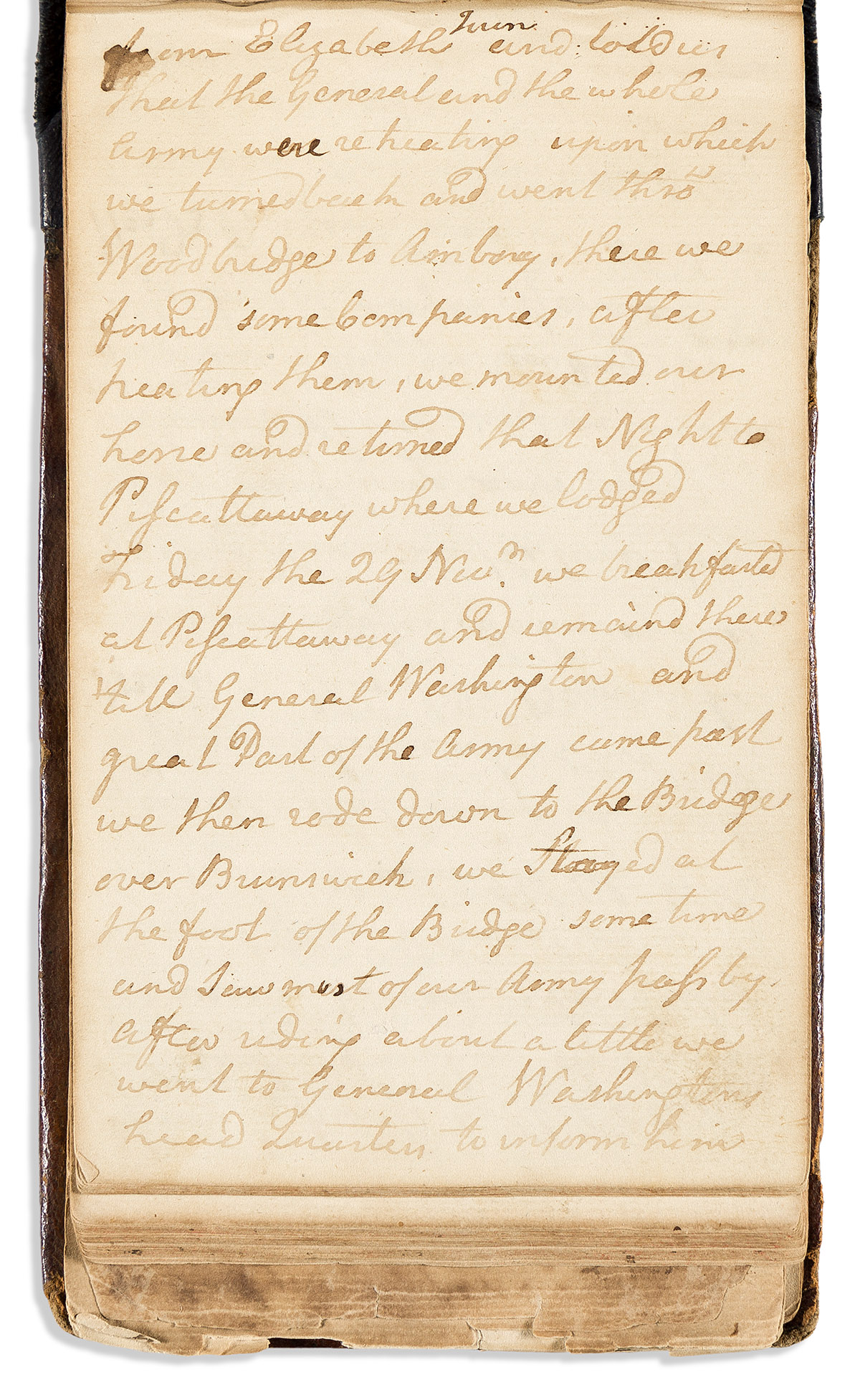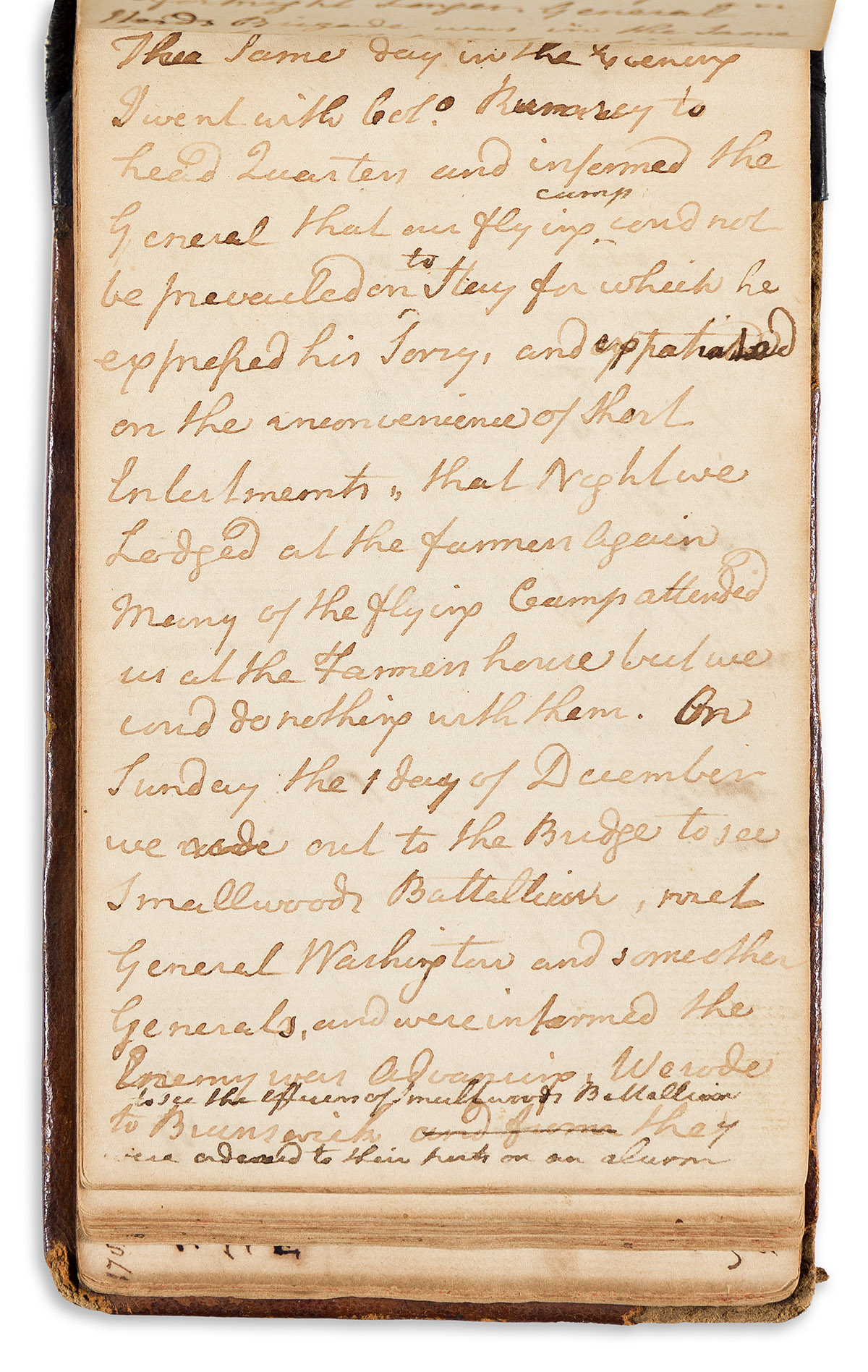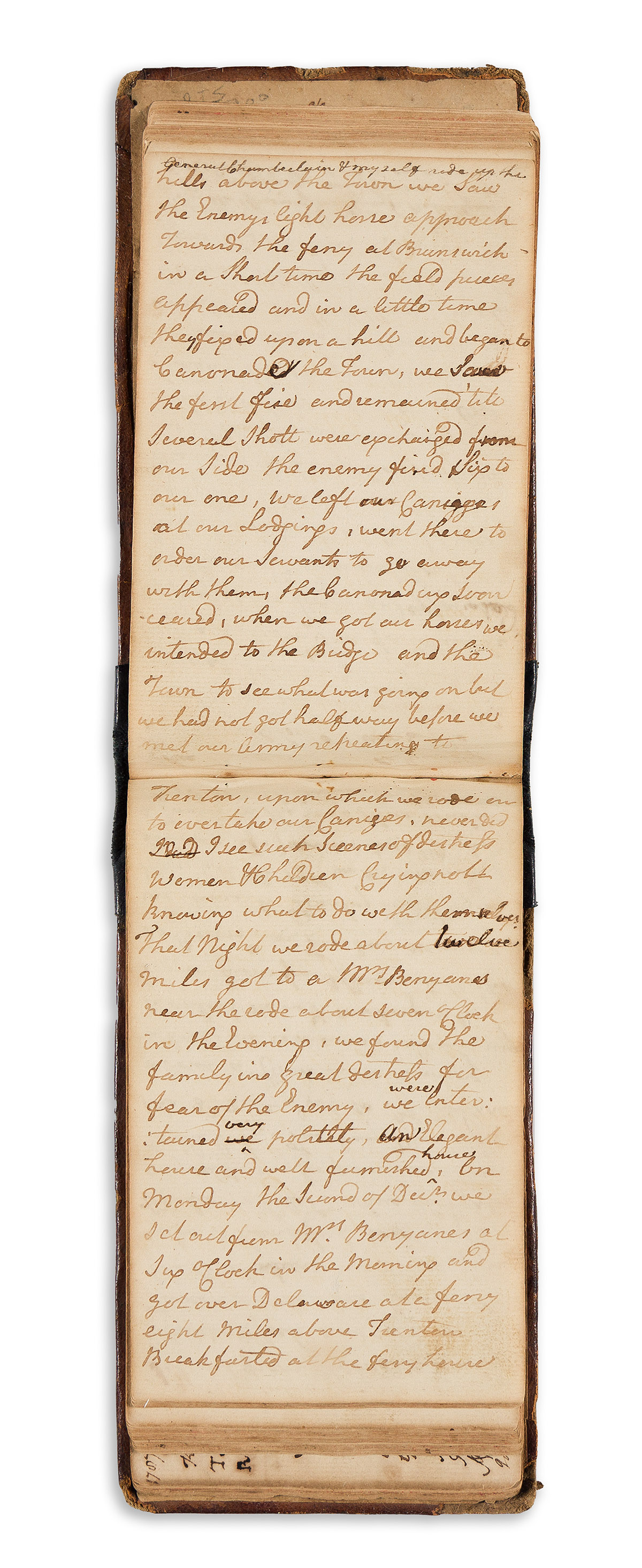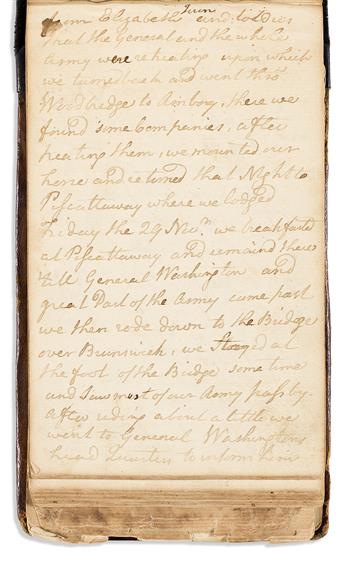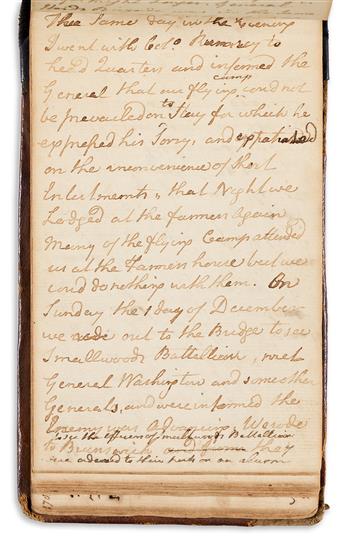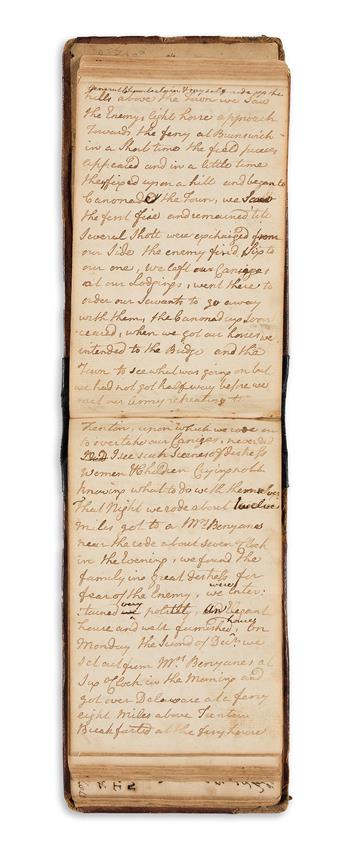Sale 2646 - Lot 28
Price Realized: $ 19,000
Price Realized: $ 23,750
?Final Price Realized includes Buyer’s Premium added to Hammer Price
Estimate: $ 25,000 - $ 35,000
(AMERICAN REVOLUTION--1776.) Thomas Contee. Diary of meetings with Washington and Hancock in the midst of the retreat from New York. [15] manuscript diary pages, plus [21] pages of memoranda. Oblong 8vo, original calf, rebacked, minor wear; partial separation to one diary leaf, numerous leaves excised which had contained "more modern entries of private business," 4 excised leaves present (including 1776 expense account) held together with pin and worn on lower edge, otherwise minimal wear to contents. With two different typed transcripts. Various places, 16 October to 21 December 1776
Additional Details
"We met our army retreating to Trenton. . . . Never did I see such scenes of distress. Women & children crying, not knowing what to do with themselves."
Thomas Contee (circa 1729-1811) was a tobacco merchant who owned the plantation Brookefield near Nottingham, Maryland, northeast of Baltimore. He was an active patriot in the years leading up to the Revolution, serving on the Committee of Observation, and as a major in the Maryland militia.
Contee attended the Maryland Convention on 16 October 1776, and was commissioned to discuss their resolves with the Continental Congress and General Washington. He was accompanied by his brother-in-law John Hanson (1721-1783), later the first president of the Confederation Congress. This diary is Contee's original account of that expedition, made more complicated by the war--the British were advancing from New York toward the Continental capital of Philadelphia. Despite all obstacles, Contee met numerous leaders of the young nation, General Washington among them, and shared his memorable impressions.
Contee arrived in Philadelphia on 21 October, where in between visiting Congressmen, he "rode out to St. David's, went into the Museum, where are the skins of many curious fish." On the 27th, he attended the afternoon service at Christ Church and "heard the famous Mr. Duche." Jacob Duché was the first chaplain of the Continental Congress. On 2 November Contee visited the gunpowder mill in Frankford, and on 5 November observed the county and city elections. In the following days, he received further instructions from Maryland, and "waited on Mr. Hancock."
On 24 November, Contee set out east toward the war zone of New Jersey. Arriving in New Brunswick on 27 November, "we found so many troops that we could not get in any house." The following day, "after preparing to proceed to meet General Washington," he was told "that the General and the whole army were retreating." On the 29th, "we went to George Washington's headquarters to inform him of our business, got but little satisfaction from him on the head. We were introduced to Lord Stirling, General Green[e], and several other gent.; was treated politely by the general."
The dramatic 1 December entry has been quoted in several histories, regarding the British capture of New Brunswick, NJ: "We rode out to the bridge to see Smallwood's battalion. Met General Washington and some other generals, and were informed the enemy was advancing. We rode to Brunswick to see the officers of Smallwood's battalion. They were ordered to their post on an alarm. General Chamberlain & myself rode up the hills above the town. We saw the enemy's light horse approach towards the ferry at Brunswick. In a short time the field pieces appeared, and in a little time they fixed upon a hill and began to canonade the town. We saw the first fire and remained 'till several shots were exchanged from our side. The enemy fired six to our one. . . . When we got our horses, we intended to the bridge and the town to see what was going on, but we had not got halfway before we met our army retreating to Trenton. . . . Never did I see such scenes of distress. Women & children crying, not knowing what to do with themselves."
Contee returned to Philadelphia, recruiting soldiers for the cause, and then headed back toward Maryland on 10 December. On the 17th he stayed with a Continental Congress delegate, Colonel Benjamin Rumsey, in Joppa, MD, described as a "very friendly, generous, open-spirited man." He met with some of the Congress at their emergency site in Baltimore on the 18th, although he missed "the president Mr. Hancock." He returned home from his two-month mission on 21 December and "found my family well, except some of the Negroes. I lost a negroe woman in my absence who was ill when I left home."
The volume also contains Contee's 2-page expense account for the 1776 trip, including meals of oysters and venison, an admission fee "for sight of the wax work," and transportation "to a tavern two miles above Wood Bridge, where we were informed the Army were retreating." The volume also contains personal financial accounts from 1777 through 1797, including detailed descriptions of tobacco shipments.
This diary was transcribed and published in full in the 13 June 1885 issue of The Current, a Chicago weekly, with an accompanying essay by James W. Owens of Maryland, pages 375-376. It has since only resurfaced twice in the public eye at auction until now. Provenance: Inscription dated June 1847 and signed "W.G.Du," likely Contee's grandson William Grafton Dulaney Worthington (1784-1856); Merwin Clayton Sales Company auction, 6 December 1910, lot 33, to a Mrs. Edwards for $26 (per the Central New Jersey Home News, 8 December 1910); Crocker Farm auction, 17 September 2011.
Thomas Contee (circa 1729-1811) was a tobacco merchant who owned the plantation Brookefield near Nottingham, Maryland, northeast of Baltimore. He was an active patriot in the years leading up to the Revolution, serving on the Committee of Observation, and as a major in the Maryland militia.
Contee attended the Maryland Convention on 16 October 1776, and was commissioned to discuss their resolves with the Continental Congress and General Washington. He was accompanied by his brother-in-law John Hanson (1721-1783), later the first president of the Confederation Congress. This diary is Contee's original account of that expedition, made more complicated by the war--the British were advancing from New York toward the Continental capital of Philadelphia. Despite all obstacles, Contee met numerous leaders of the young nation, General Washington among them, and shared his memorable impressions.
Contee arrived in Philadelphia on 21 October, where in between visiting Congressmen, he "rode out to St. David's, went into the Museum, where are the skins of many curious fish." On the 27th, he attended the afternoon service at Christ Church and "heard the famous Mr. Duche." Jacob Duché was the first chaplain of the Continental Congress. On 2 November Contee visited the gunpowder mill in Frankford, and on 5 November observed the county and city elections. In the following days, he received further instructions from Maryland, and "waited on Mr. Hancock."
On 24 November, Contee set out east toward the war zone of New Jersey. Arriving in New Brunswick on 27 November, "we found so many troops that we could not get in any house." The following day, "after preparing to proceed to meet General Washington," he was told "that the General and the whole army were retreating." On the 29th, "we went to George Washington's headquarters to inform him of our business, got but little satisfaction from him on the head. We were introduced to Lord Stirling, General Green[e], and several other gent.; was treated politely by the general."
The dramatic 1 December entry has been quoted in several histories, regarding the British capture of New Brunswick, NJ: "We rode out to the bridge to see Smallwood's battalion. Met General Washington and some other generals, and were informed the enemy was advancing. We rode to Brunswick to see the officers of Smallwood's battalion. They were ordered to their post on an alarm. General Chamberlain & myself rode up the hills above the town. We saw the enemy's light horse approach towards the ferry at Brunswick. In a short time the field pieces appeared, and in a little time they fixed upon a hill and began to canonade the town. We saw the first fire and remained 'till several shots were exchanged from our side. The enemy fired six to our one. . . . When we got our horses, we intended to the bridge and the town to see what was going on, but we had not got halfway before we met our army retreating to Trenton. . . . Never did I see such scenes of distress. Women & children crying, not knowing what to do with themselves."
Contee returned to Philadelphia, recruiting soldiers for the cause, and then headed back toward Maryland on 10 December. On the 17th he stayed with a Continental Congress delegate, Colonel Benjamin Rumsey, in Joppa, MD, described as a "very friendly, generous, open-spirited man." He met with some of the Congress at their emergency site in Baltimore on the 18th, although he missed "the president Mr. Hancock." He returned home from his two-month mission on 21 December and "found my family well, except some of the Negroes. I lost a negroe woman in my absence who was ill when I left home."
The volume also contains Contee's 2-page expense account for the 1776 trip, including meals of oysters and venison, an admission fee "for sight of the wax work," and transportation "to a tavern two miles above Wood Bridge, where we were informed the Army were retreating." The volume also contains personal financial accounts from 1777 through 1797, including detailed descriptions of tobacco shipments.
This diary was transcribed and published in full in the 13 June 1885 issue of The Current, a Chicago weekly, with an accompanying essay by James W. Owens of Maryland, pages 375-376. It has since only resurfaced twice in the public eye at auction until now. Provenance: Inscription dated June 1847 and signed "W.G.Du," likely Contee's grandson William Grafton Dulaney Worthington (1784-1856); Merwin Clayton Sales Company auction, 6 December 1910, lot 33, to a Mrs. Edwards for $26 (per the Central New Jersey Home News, 8 December 1910); Crocker Farm auction, 17 September 2011.
Exhibition Hours
Exhibition Hours
Aliquam vulputate ornare congue. Vestibulum maximus, libero in placerat faucibus, risus nisl molestie massa, ut maximus metus lectus vel lorem.



